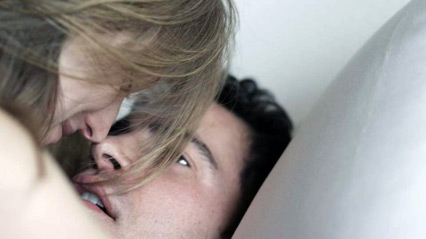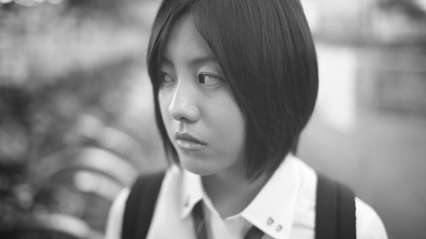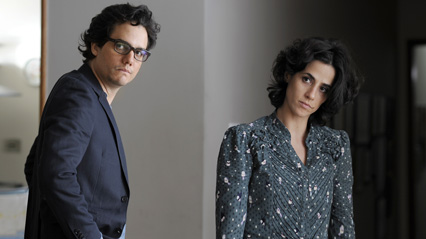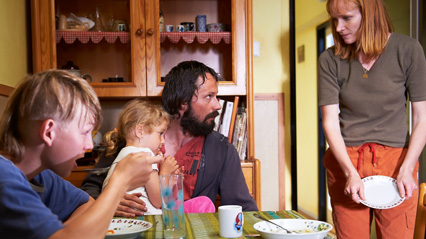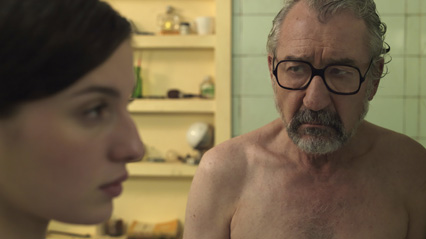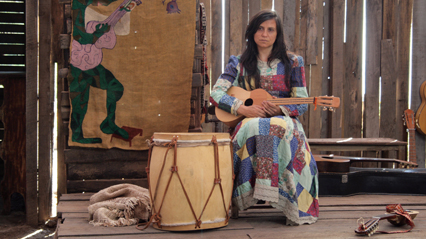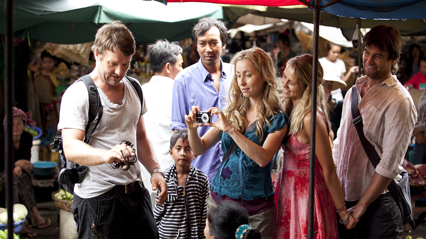My Sundance pace finally caught up with me, knocking me pretty much flat for a couple days, but here’s the last bit of my Sundance coverage this year. For me, this year was what my great-grandma would have called a “fair to middlin’” sort of Sundance. In other words, there were plenty of films that were decently good, or at least mostly harmless, but an awful lot of them were safe, what many of us have come to think of as “made for Sundance” material.
There were a few standouts: Safety Not Guaranteed had a warmth and depth that went far beyond what it seemed to be on its humorous surface, and featured a far more complex and interesting performance than we’ve seen from Mark Duplass in the past. Could he be one of those actors known for comedic work, who ends up being most intriguing when he’s working in the darker corners of the human psyche? I think he just might. Compliance was brilliantly edgy and uncomfortable and real in a way that Shame wanted to be but wasn’t, quite; For Ellen was a deceptively simple character study executed with patience and painterly beauty.
And then there was Beasts of the Southern Wild – either the miracle of the fest or the most miraculously over-hyped, depending on who you ask. For me this film fell squarely into the realm of the remarkable; in spite of some flaws in its execution, its creative scope was far beyond the way most newer filmmakers even dare to dream, and its ambition was impressive. Filmmaker Behn Zeitlin could be a flash in the pan, sure … but when did we last see a filmmaker coming of the independent film circuit with this kind of fantastical vision? Beasts of the Southern Wild was, for me, good cinematic storytelling on its own, but it’s most interesting for what it foretells about what this filmmaker might do in the future. For that alone, it was one of the most exciting films of this year’s Sundance.
There tends to be more buzz about the US competition categories at Sundance, but very often the more interesting and challenging selections can be found in the other sections. Here’s a few to keep your eye out for.
Elena, Andrei Zvyagintsev
This lyrical, beautifully lit and shot poem of a film, which won the Un Certain Regard Jury Prize at Cannes in 2011, tells the story of Elena (Nadezhda Markina), a middle-aged woman comfortably ensconced in a marriage to a Vladimir (Andrey Smirnov), a wealthy, emotionally distant older man. Both Elena and Vladimir had adult children when they met; Vladimir rarely sees his rebellious daughter, and Elena’s son cannot support his family and is always hitting her up for money. Within their marriage, Elena’s role is more that of caregiver and companion than lover and life partner. It’s a compromise she seems to have accepted – until her husband, after a heart attack scare, has a briefly touching reunion with his estranged daughter and decides impulsively to change his will to leave almost everything to her.
Elena, who desperately wants to help her underachieving, slacker adult son, and pay the fee to get her equally underachieving grandson into university so he doesn’t have to go into military service, suddenly finds herself facing a desperate choice, and this seemingly docile wife reveals a determination belied by her earlier complacent ease. Zvyagintsev’s taut, controlled direction maintains tension without being overly manipulative, and the sound design, which augments every drip of water, chirp of bird, footstep on hardwood floor, effectively heightens our sense of being in the moment, watching what unfolds.
Father’s Chair, Luciano Moura
Still photographer Luciano Moura makes his feature debut in this gorgeously composed film that turns the coming-of-age tale on its head, by showing us the journey of a runaway teenage boy through the eyes of his father, who’s desperately trying to find him. We meet Theo (Wagner Moura, in a terrific performance), a well-to-do doctor whose marriage to his wife has fallen apart as both of them have focused on their careers, as his 14-year-old son disappears on an adopted horse, leaving behind a trail of clues as to his whereabouts and two parents suddenly reunited in their overriding concern for their son’s well-being. Theo’s journey to find his son finds him learning about the young man his son has grown to be, and forces him to confront some long-held beliefs about his own life.
28 Hotel Rooms
One of the genuine surprises of the fest for me. I ended up seeing 28 Hotel Rooms by happenstance, when a ticket for the screening I’d planned to attend failed to materialize. The publicist for 28 Hotel Rooms had reached out a couple days earlier, and with a sudden hole in my schedule I decided to check it out – and I was glad I did. Chris Messina and Marin Ireland play a pair of business travelers who hook up for what both of them think will be a one-night stand. Their attraction to each other proves intense, though, and the two sustain an sporadic union of sorts, played out over brief one or two day dalliances over months and years, through their other relationships and respective marriages, until they finally start to realize that it’s the relationship they have with each other that really may be the most permanent one of all.
Heartfelt performances by Messina and Ireland carry the film, which relies wholly on these two people and the snippets we see of them in these brief moments when their lives intersect to make us care about what becomes of their relationship. Direction by first-time writer/director Matt Ross is exceptionally well-constructed; this isn’t the easiest conceit to pull off and make it work without boring your audience, but he does so quite nicely. The program description made this sound like a film about 28 nights of indiscriminate hotel sex, but it’s really not. There’s sex in there, yes, but the focus of this film is on these two people, why they’re drawn to each other in spite of their differences, and what about each of them keeps their relationship as it is.

Wuthering Heights
An adaptation of a classic work of literature might not seem like the logical place for an award-winning writer-director of original films to head next. But Andrea Arnold’s striking interpretation of Wuthering Heights, Emily Brontë’s singular masterpiece of obsession and unrequited love, is so starkly vivid and visually strong that it’s clear for that for Arnold, who works in realism, delving into the muck and mire of the Yorkshire moors is a very comfortable place to be. And really, it’s not that far a stretch from Arnold’s previous works, when you get down to it. Arnold’s Oscar-winning short film Wasp and features Red Road and Fish Tank, which won the Jury Prize at Cannes in 2006 and 2009, respectively, are set in run-down housing projects, with characters who could be said to be outsiders of a sort, each in their own way.
Arnold shifts the perspective of the novel away from Nelly Dean, the storyteller, and Lockwood, the rapt listener, by truncating the tale to focus almost entirely on the relationship between Cathy and Heathcliff. This shift of perspective is subtle but important; as a literary device, the entire tale is filtered first through Nelly Dean’s perspective as a storyteller, a gossip, and a lover of stories herself, and then through Lockwood’s own class biases as he listens to the tale; this greatly affects how the events are interpreted. In other words, where the book never attempts objectivity because the tale being told is clearly an embellished one, here there is no observer within the story itself, leaving us to interpret the events as if they are, in fact, objective truths within the world of the story.
For me, this didn’t quite work because without Nelly Dean’s embellishment and romanticizing, Cathy feels even less sympathetic in that she comes across as caring solely about money and security rather than love (true enough), while Heathcliff seems to be always just stomping around glaring angrily, slamming doors, and being generally ungrateful and recalcitrant without the sympathetic glean of Nelly Dean’s interpretation of events adorning them. Without Nelly’s lens to focus the tale, we have two characters who aren’t, in and of themselves, greatly likable; thus this adaptation becomes more an observation of events than a tragedy in which we come to feel significantly invested.
Nonethless, the issues of class and love that seem to drive much of Arnold’s work are very present. Here, Wuthering Heights, where the younger Cathy and Heathcliff (Shannon Beer and Solomon Glave, both terrific) roam, play and love freely and wildly on the moors is contrasted vividly with the more genteel Thrushcross Grange, where Edgar Linton ( James Northcote) will offer Cathy wealth and security, if not Heathcliff’s fiery passion and unending angst. The class differences in Wuthering Heights, emphasized not only by the physical aspects of Wuthering Heights verus Thrushcross Grange, but by the difference in the way dark-skinned Heathcliff is treated by Cathy’s father (the respect and kindness of benevolent charity), by her brother Hindley (the rage and anger inflicted by the usurped upon the perceived usurper), by Edgar Linton (master and servant) and by Cathy herself (love and its flipside, cruelty), all call upon themes that underscore much of Arnold’s work in more modern settings.
Visually, Andrea Arnold’s Wuthering Heights is stunningly beautiful, with desolate frames of windy moors, and the most realistic depiction of the sanitary conditions of its time since, perhaps, Tom Tywker’s Perfume. You can practically feel the chill, damp wind blowing you nearly sideways, the muck of the mud holding fast to your shoes with every step. Sound, too, is excellently used in augmenting the storytelling and creating a sense of time and place. But when we get to older Cathy and Heathcliff ( Kaya Scoldelario and James Howson), somehow we lose much of the passion that underlies the tale; the fire that smolders in Heathcliff’s breast, this ancient, destructive love , Heathcliff’s unrelenting fierce anger at being denied what he wants even after overcoming a lifetime of servitude and indignities, are played up by Nelly Dean’s sympathetic perspective, and that element is missing here. Arnold’s version of Wuthering Heights is certainly the most visually stunning of the film versions of this tale, but from a literary standpoint, Cathy and Heathcliff need Nelly Dean to soften them up a bit and make them more palatable.







